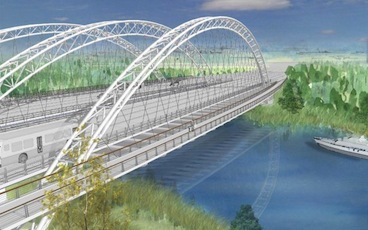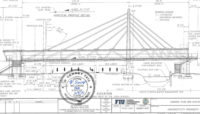
When a Canadian bank pushed Concreate USL Ltd. into receivership March 16, dozens of projects in eastern Canada and the U.S. stopped dead or slowed down, leaving cities and subcontractors in limbo.
The biggest is the Strandherd-Armstrong Bridge in Ottawa, for which Concreate USL Ltd., is the prime contractor. The receivership also applied to a related company, Triwest Construction, whose parent, Triwest Capital Partners, had invested in Concreate last year.
According to legal papers filed by Concreate’s surety, The Guarantee Co. of North America, the steel fabricator on the Ottawa bridge project is owed $4.57 million and won’t ship more structural steel to the jobsite until it has been paid.
The bridge, which will span the Rideau River, has been designed with three arched trusses. Concreate planned to assemble them on the river’s east bank.
But last month, the Bank of Nova Scotia gave up after months of negotiations and demanded that Concreate and Triwest repay what was owed the bank, according to court documents. The bank says Triwest and Concreate owe the Bank of Nova Scotia and other lenders about $34 million.
So the Strandherd-Armstrong Bridge, whose cost has been listed as $49.6 million, remains about 60% finished while the bank and the surety make various motions before Judge Colin Campbell in the commercial section of the Ontario Superior Court of Justice.
On March 20, the city of Ottawa issued a reassuring press release stating that creditors had forced Concreate into receivership. “It is important to note that work on the bridge is estimated to be about 60% complete and the City holds a Performance Bond of $23,024,904 which should ensure the completion of the project,” the city statement said.
Untangling All the Interests
But because the default involves so many projects, time may slip by as all the different interests are untangled. And delays in construction often lead to change orders and claims.
According to a newspaper Website for Halton, a town near Lake Ontario and Burlington, Ontario, Concreate USL had contracts to rehabilitate six bridges spanning the Queen Elizabeth Way and other work on lanes of the Garden City Skyway. “Work has ceased on all sites,” the Ministry of Transportation told the newspaper.
The receiver appointed for Concreate and Triwest, Grant Thornton, has requested that the court hold off on any proceedings against Concreate until next week.
Counting the Ottawa and Halton-Burlington area bridge projects, Concreate has dozens of small contracts, most of them in the $1 million to $2 million range involving concrete rehabilitation work or repairs, a company specialty. One of them is the Assiniboine Avenue Overpass and Bridge Rehabilitation in Regina, where the contract price is $2.35 million.
Concreate began in 1971 as Underground Services Ltd., a tunneling conractor in Moncton, New Brunswick, but more recently it has specialized in concrete rehabilitation and construction. The main office of Concreate is Bolton, Ontario.
Guarantee Co. issued bonds to Concreate and Triwest from May, 2010 to Sept., 2011, with a total value of $214 million.
Concreate’s financial picture going into 2011 isn't clear. On its website Concreate indicates that early last year it received a cash injection from “a new financial and operational partner,” Triwest Capital Partners, “one of Canada’s largest private equity firms.” The new partner “thus strengthens our access to financial and capital markets,” the firm said.
Officials of Concreate could not be reached for comment. Nor could officials of the city of Ottawa or the Bank of Nova Scotia.
But in an affidavit submitted to Judge Campbell, the bank’s special accounts senior management, Rick Sackfield, said the bank and Triwest Construction entered into a credit agreement in February 2011, with Triwest’s assets and construction equipment pledged as security. After entering the credit agreement, the bank says it learned that Triwest Construction’s cost estimates were far off the mark on several major projects, and Triwest took write-downs on the contacts of $15.4 million.
From the time of the bank’s credit agreement in February until December 2011, Triwest’s annual earnings had dropped from $19.9 million to $8.5 million, according to Sackfield.
From last August until March, according to Sackfield’s affidavit, the bank negotiated with Triwest and Guarantee Co. of North America, to no avail.








